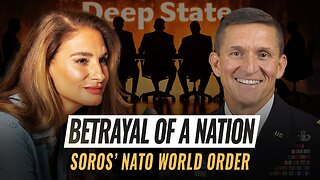Premium Only Content

Episode 2070: Marcel: The Remnant - Part 2
Continuation from Episode 2068 Marcel The Remnant - Part 1
Chapter 11: Mission and Conversions in Gabon
Fr. Marcel Lefebvre gently guided the motorboat through the tranquil waters of Gabon, accompanied by a few children from the mission. The sun cast a warm glow over the landscape as they moved along the river.
"Father, there's a pirogue (peer-rogue) approaching from the mission!" exclaimed one of the children, pointing ahead.
Fr. Marcel furrowed his brow, a sense of concern creeping into his voice. "From the mission? Why? What could be the matter?"
As the pirogue pulled alongside Fr. Marcel's boat, the occupants struggled to secure their vessel to his.
"Do you need assistance?" Fr. Marcel inquired; his voice tinged with urgency.
"Father, there's an urgent letter for you," one of the men in the pirogue announced.
"Please, read it to me," Fr. Marcel requested, his heart pounding with apprehension.
The man unfolded the letter and began to read aloud. Fr. Marcel's expression turned ashen as he listened.
"It's from Fr. Laurent," the man continued, his voice echoing with the weight of the message.
"From the Novitiate?" Fr. Marcel interjected, his mind racing.
"Yes, Father. He is now the provincial of France. He is asked Bishop Tardy to release you from Gabon so you can be appointed the rector of the seminary of philosophy at Mortain," the man explained.
Fr. Marcel's heart sank as the reality of the news set in. He struggled to maintain his composure, his mind swirling with conflicting emotions.
"Is there something wrong, Father?" the man in the pirogue inquired, sensing Fr. Marcel's distress.
"No, nothing is wrong. Thank you for delivering the message," Fr. Marcel replied, his voice barely above a whisper.
As the pirogue departed, Fr. Marcel's thoughts turned to his brother, Fr. René Lefebvre, back at the mission.
Later that evening, Fr. Marcel sat on the edge of Fr. René's bed in the seminary in Gabon, his face etched with concern.
"Marcel, why the long face? What is troubling you?" Fr. René asked, observing his brother's somber demeanor.
"The appointment is in Mortain, not Siberia! Why are you so distraught?" Fr. René continued; his tone gentle yet firm.
"René, you and I are missionaries. This is our calling, our purpose," Fr. Marcel replied, his voice filled with uncertainty.
Fr. René chuckled softly. "Still fighting divine providence, aren't you?"
"It's not that, René. I thought I was meant to be here in Gabon," Fr. Marcel confessed, his voice tinged with sadness.
"But perhaps there's a reason you're being called back to Europe," Fr. René suggested, his eyes searching for his brother's troubled face.
Fr. Marcel sighed, his thoughts drifting to their father and the sacrifices he had made during the war.
"Do you remember how Father used to tell us about Pope Leo's vision?" Fr. Marcel asked, a hint of desperation in his voice.
"Yes, he always reminded us of the importance of prayer and vigilance," Fr. René replied, his expression thoughtful.
"I truly believe that Satan himself is walking the earth today," Fr. Marcel declared, his voice trembling with emotion.
"And perhaps your return to Europe is part of a greater plan," Fr. René remarked, his tone filled with conviction.
Chapter 12: A New Appointment
Two years later, Fr. Marcel sat behind his desk in the seminary at Mortain, his thoughts consumed by the unexpected turn of events.
"Father Lefebvre, the superior general is on the phone for you," the vice-rector announced, interrupting Fr. Marcel's reverie.
Fr. Marcel's heart skipped a beat as he picked up the receiver, his hands trembling slightly.
"Yes, Your Excellency, how can I assist you?" Fr. Marcel inquired, his voice betraying his anxiety.
"Marcel, I have some good news for you," Bishop Le Hunsec began, his tone warm and reassuring.
Fr. Marcel's mind raced as he listened to the bishop's words, his pulse quickening with each passing moment.
"You have been appointed Vicar Apostolic of Dakar," Bishop Le Hunsec revealed, his voice filled with pride.
Fr. Marcel's head spun with disbelief as he processed the magnitude of the news. "But Your Excellency, I never imagined myself in such a position..."
"Marcel, Divine Providence works in mysterious ways. Trust in God's plan for you," Bishop Le Hunsec counseled, his words echoing with wisdom.
As Fr. Marcel contemplated his new role, he could not help but feel a sense of trepidation mingled with excitement. The journey ahead would be challenging, but he knew that with faith and determination, he would fulfill his duties with zeal and devotion.
In the grand halls of Our Lady of Tourcoing, a serene church where Cardinal Lienart performs the consecration. The year is 1947, a time of profound significance in the life of Bishop Marcel Lefebvre.
Bishop Marcel Lefebvre stands before the congregation, delivering his speech with grace and conviction. Cardinal Lienart watches from behind, his expression a mixture of curiosity and perhaps a hint of disdain, while Bishop Lefebvre's family looks on with pride and anticipation.
"I have been so very fortunate to be blessed by Divine Providence my entire life," Bishop Lefebvre begins, his voice echoing through the hallowed halls of the church. "At times when I was certain nothing good could come from the events at the time."
He pauses, reflecting on the journey that has led him to this moment. "If it was not for the insight of my Father on the changes going on in the Church, I surely would have become a Diocesan priest," he continues. "But my Father insisted that I study under Father Le Froch."
With each word, Bishop Lefebvre's deep respect for his mentor, Father Le Froch, becomes evident. "Without the blessed sound principles of Fr. Le Froch, I would never have been properly, attached to the faith nor understood the drama that was going on in the Church," he declares.
As Bishop Lefebvre's speech draws to a close, the camera captures Cardinal Lienart's reaction, his disapproval palpable.
It is November 16, 1947, and Bishop Lefebvre is about to take possession of the episcopal see of Dakar.
Bishop Lefebvre enters the solemn procession and is greeted by a packed congregation. He is welcomed by the authorities and priests, his presence commanding respect and admiration.
Amidst the welcoming ceremony, a conversation ensues between Bishop Lefebvre and a concerned parish member, highlighting the pressing need for a boys' school in the area. As Bishop Lefebvre listens attentively, his commitment to serving the community becomes evident.
"The boys' school. Is that a need at this time?" he inquires, his voice filled with determination.
"Yes, there is a need," Father Scarlota replies earnestly. "The girls' schools are functioning very well, but there is nothing for boys."
Bishop Lefebvre nods thoughtfully, already contemplating how to address this urgent need. "Well, we have to do something about that," he declares. "I shall first do my research."
Holy Ghost Mother House in September 1948, where Bishop Lefebvre is approached by a priest with news of immense importance. Bishop Lefebvre prepares to meet with the Superior General, a sense of anticipation hanging in the air.
"Come in, Excellency, come in," the Superior General beckons, his voice filled with warmth. "I have great news for you."
Bishop Lefebvre enters cautiously, bracing himself for the revelation that awaits him. Little does he know; his life is about to take a dramatic turn.
Bishop Lefebvre meets with Pope Pius XII in his office chambers. The atmosphere is charged with reverence as Bishop Lefebvre kneels before the Pope, his expression one of humility and respect.
"It is great to finally meet you, Your Excellency," Pope Pius XII greets him warmly, their conversation delving into matters of immense importance to the Church.
Pope Pius XII confides in Bishop Lefebvre, sharing his concerns about the rise of liberalism and modernism within the Church. Bishop Lefebvre listens intently, his resolve strengthened by the Pope's words of wisdom.
Bishop Lefebvre's travels as Apostolic Delegate, traversing the vast expanse of Africa to fulfill his duties with unwavering dedication.
Father Walter Jaeger and Father Michael Gabrielli are reflecting on Bishop Lefebvre's tireless efforts and remarkable accomplishments. Their dialogue paints a vivid picture of Bishop Lefebvre's impact on the Church and the world.
Leaving the audience with a sense of awe and admiration for Bishop Marcel Lefebvre, a man whose legacy continues to inspire generations to come.
Chapter 13: The Concerns of Archbishop Lefebvre
"Yes, so you do remember! How have the Roman Curia been supporting your efforts?" Pope Pius XII inquired.
"For me to come to Rome I am always just so grateful to be among the Curia that I seem to left most unpleasant matters pass me by," replied Archbishop Marcel Lefebvre.
"And of course that is what they expect. What exactly are you referring to?" the Pope inquired further.
"I was pleased with your election of Cardinal Tardi as the Secretariat of State, he is truly very supportive," Lefebvre remarked.
"But?" Pope Pius XII prompted.
"But there are a certain number among who treat me almost as if I stole their position once I became Apostolic delegate. It is as if because I did not go through the normal steps..." Lefebvre hesitated.
"Wait. Let us see if I can tell you what they may be saying: 'You did not go through the Academy of Noble Ecclesiastics in Rome which forms future diplomats, nuncios. To become archbishop of Dakar right away and then, bang, apostolic delegate! You are an intruder! You have taken a position which could have been given to us,'" Pope Pius XII interjected.
"Exactly, Holy Father!" Lefebvre confirmed.
"Would you mind telling me who in the Curia treats you this way?" Pope Pius XII inquired.
"I would rather not say, your Holy Father," Lefebvre hesitated.
"Well, it is not like I will tell anyone, so if you refuse I will have to command you," the Pope joked. "But seriously, Marcel, I would like to know. I need to know."
"Well, there is Bishop Montini, Bishop Martin, your previous Secretariat of State, and Monsignors of Propaganda," Lefebvre disclosed.
"I could have written these names down before you said them. The one who concerns me most is one who was remarkably close to me up until 5 years ago," the Pope revealed.
"Your previous Secretariat of State?" Lefebvre guessed.
"No. It is Bishop Montini. I intentionally do not want to promote him to a Cardinal Position because his liberal views are very destructive. He acts one way but is actually leading the cause for a new council, possibly a second Vatican council," Pope Pius XII explained.
"Why, your Holy Father?" Lefebvre inquired.
"Because unlike Bishops and Cardinal who are doing Christ’s work throughout the world, there are those like Bishop Montini who believe themselves to be the intellects of the Church who want a much more current or modern church. They take almost a protestant bent," the Pope elaborated.
"To be perfectly honest with you, Holy Father, I have been noticing this element in Rome for quite some years," Lefebvre admitted.
"I have refused this council on many occasions, but I am certain after my death the Curia will be very active in their election of a Pope who will call such a council. That is why I do not want the Montini’s of the Curia to become Cardinals. I fear their election through the College of Cardinals," Pope Pius XII confessed.
"Your Holy Father, I am so outside of this Curia circle due to my travels that I guess I never saw it from your viewpoint. This is the same concern you had in 1948," Lefebvre reflected.
"Yes, only it is much, much stronger now. In your travels have you had much occasion to speak with Cardinal Roncalli?" the Pope inquired.
"Oh yes, Holy Father. In the early years when he was Apostolic Nuncio of Paris. When I occasionally return to Paris in those years for the apostolic delegate, I sometimes meet with Bishop Roncalli at the nunciature," Lefebvre recalled.
"How did you get along?" the Pope asked.
"Well, each time I am there, he not only invited me, but he also insisted on seeing me," Lefebvre answered.
"Very good. How were your discussions?" Pope Pius XII probed.
"Very pleasant. He was always exceedingly kind to me. He did, however, make a comment to me one time that I was not sure how to take," Lefebvre admitted.
"What was it?" the Pope inquired.
"He said: 'If you ask me, I do not think archbishops like you, who have a diocese, should also, at the same time, be apostolic delegate. To me it is not a clever idea. Bah! But that is none of my business, was it?'" Lefebvre recounted.
"Yes, that sounds like Angelo. He was a particularly good Bishop for France and is doing an excellent job as the Cardinal in Venice but always the politician. But his support for many of those in the Curia that have liberal bents is overly concerning. He supports Montini very strongly," the Pope remarked.
"Your Holy Father, you have been so very good to me and me even at times have to pinch myself when I find I am once again coming to Rome to meet with you. I never thought as a simple priest I would be so blessed to work under a Pope let alone one like yourself. But now I am troubled because I sense you are in pain over what you see coming," Lefebvre expressed.
"I am, Marcel, and it is so good of you to be concerned. But I once told you to be on guard. Now I tell you I do not feel I have many more years ahead of me. I need you to stay vigilant for the sake of the Church. Stay strong among those of you who know the Tradition," Pope Pius XII implored.
"Your Holy Father, I promised you in 1948 and I promise you now. I will stay vigilant," Lefebvre vowed.
"This council will come. Pope Pius XI did all he could to stop it from happening and I have worked just as hard during my pontificate. But the growth of liberalism and modernism is so powerful. The world is demanding it, the priests demanding it, the Bishops and the Cardinals are demanding it so," the Pope lamented.
"But Holy Father, the Church has never been of this world and only in it. The Church has always been a beacon and not a follower. How can it be?" Lefebvre questioned.
"Marcel, I tell you that a time will come when what the Protestant Reformation accomplished in the 1600s through sheer intimidation, destruction, and murder will happen to the Church not through outsiders but by the very Church itself. Only this time the reformation will be done with a smile instead of a sword. There will be no force, but pure deception," Pope Pius XII predicted.
"I can see that as so!" Lefebvre acknowledged.
"Let’s pray to God you are right, but things are lining up as we speak that make it so," the Pope concluded.
Chapter 14. Winds of Change - Conversations with Rome
In the colonies, a breeze of independence swept through, often originating from the United States. This movement advocated for political, economic, and even religious independence, a notion embraced by many within the clergy and the Roman Curia. From a religious perspective, independence boiled down to one simple concept: replacing European bishops with African bishops.
"Was that such a bad thing?" questioned Father Walter Jaeger. "After all, we have American bishops, don't we?"
Father Michael Gabrielli nodded thoughtfully. "If you were familiar with Archbishop Lefebvre, you'd understand that he wasn't opposed to the idea of African bishops per se. What concerned him was the process of their formation. He feared that some were elevated to the episcopacy for political reasons rather than genuine readiness for the responsibilities."
Father Walter leaned in, intrigued. "Isn't that still an issue today, both in the United States and Europe?"
"Exactly," replied Father Michael. "Individuals often ascend to positions of authority not based on merit, but due to political maneuvering. It's a dangerous trend, especially within the Church."
Father Walter furrowed his brows. How did Rome view this situation?"
"It was Rome's desire as well," explained Father Michael. "Bishop Constantini made a statement at the Congregation of the Propaganda that deeply unsettled Archbishop Lefebvre."
"What did he say?" Father Walter inquired.
"He asserted that the true conversion of Africa and other mission territories wouldn't come from European bishops but rather from African bishops," recounted Father Michael.
"Perhaps Bishop Constantini was overly optimistic due to his unfamiliarity with Africa," mused Father Walter.
"Perhaps," conceded Father Michael. "But it was a sentiment reflective of the Vatican II era, where traditional structures were being challenged."
"He must have been taken aback by such statements," remarked Father Walter.
"Indeed," agreed Father Michael. "Archbishop Lefebvre had spent decades shaping the Church in Africa. He wasn't accustomed to being questioned by those unfamiliar with the realities on the ground."
"How did he react?" asked Father Walter.
"He defended his stance," replied Father Michael. "Insisting that if African bishops were to be appointed, they must be not only capable but also adequately supported for their mission."
Chapter 15: The Changing Times - Resignation and Transition
"So, the times were changing," Father Walter remarked with a chuckle.
"Indeed," chuckled Father Michael. "It was a period of upheaval, akin to Bob Dylan's 'The Times They Are a-Changin'."
"What did Archbishop Lefebvre do?" inquired Father Walter.
"He fought against the tide for as long as he could," explained Father Michael. "But eventually, the pressure from the Roman Curia to comply with their directives became too great."
"So, the times were indeed changing," Fr. Walter remarked with a chuckle, drawing parallels to Bob Dylan's famous song.
"Yes, precisely," Fr. Michael concurred. "Archbishop Lefebrve fought against these changes for as long as he could. However, the Roman Curia began emphasizing obedience, and one thing Archbishop Lefebrve always respected was obedience to his superiors. Eventually, he found himself at odds with the direction the Church was taking, and later, he would regret it."
"Did he lose his position as Archbishop?" asked Father Walter.
"No," answered Father Michael. "In early 1962, amidst the fervor of the Second Vatican Council, he chose to resign from his post in Dakar and focus his attention on the council proceedings."
"Was his resignation accepted?" queried Father Walter.
"Yes, it was," confirmed Father Michael. "However, he requested a delay before being reassigned, hoping for an opportunity within the Holy Ghost Fathers."
"And did that opportunity arise?" Father Walter leaned in with interest.
"Yes," nodded Father Michael. "In August 1962, he was elected as the Superior General of the Holy Ghost Fathers. Yet, even this election was not without its challenges."
Despite the challenges, Archbishop Lefebvre accepted the outcome with humility, acknowledging that even a small diocese presented many opportunities for service. His journey continued, marked by steadfast dedication to his convictions amidst a rapidly changing ecclesiastical landscape.
Fr. Walter, seeking clarification, remarked, "Father, I can't help but notice a hint of criticism toward Vatican II in your words. Why the cynicism?"
Fr. Michael clarified, "It's not cynicism as much as it is a reflection of my point. Archbishop Lefebrve was taken aback by the constant change being influenced by the Roman Curia. He was accustomed to the Pope being the final arbiter, to having conversations with the Pope about who was fit for such roles. This was a departure from tradition, a new era of committee-based decision-making that prioritized optics over the welfare of the Church."
Chapter 16: The Council's Shadow
As the years passed, Archbishop Lefebrve found himself increasingly disillusioned with the direction of the Church. The Second Vatican Council, initially hailed as a beacon of renewal and reform, had begun to cast a long shadow over the Church.
Fr. Walter Jaeger, intrigued by the Archbishop's journey, asked, "What was it about Vatican II that troubled him so deeply?"
Fr. Michael Gabrielli sighed, a weighty expression settling on his features. "It was the ambiguity, the uncertainty that arose from the council's proceedings. Vatican II was meant to bring renewal and adaptation to the modern world, but it quickly became apparent that it was being hijacked by liberal factions within the Church."
"Liberal factions?" Fr. Walter echoed; eyebrows raised in surprise.
"Yes, liberal factions pushing for radical changes that were antithetical to the traditional teachings of the Church," Fr. Michael explained. "The Archbishop feared that the council's open-ended discussions would lead to doctrinal confusion and erosion of orthodoxy."
Fr. Walter frowned, troubled by the implications. "But wasn't the Pope overseeing the council? Why didn't he intervene?"
Fr. Michael shook his head ruefully. "Pope John XXIII's death marked a turning point. His successor, Pope Paul VI, faced immense pressure from progressive forces within the Church. As the council progressed, it became increasingly apparent that certain elements were intent on pushing their agenda, regardless of the consequences."
"The Archbishop must have felt like he was swimming against the tide," Fr. Walter remarked sympathetically.
"Indeed," Fr. Michael agreed. "He saw the council as a vehicle for compromise and accommodation, rather than a reaffirmation of Catholic doctrine. His warnings went unheeded, drowned out by the clamor for change."
Fr. Walter paused, deep in thought. "So, Archbishop Lefebrve was a voice crying out in the wilderness, advocating for orthodoxy in the face of growing dissent."
"Exactly," Fr. Michael affirmed. "But his warnings fell on deaf ears. The winds of change were blowing, and the Archbishop found himself increasingly isolated."
As Archbishop Lefebvre navigated the tumultuous waters of the post-council era, he found himself grappling with a Church in flux, torn between tradition and innovation. Fr. Walter Jaeger leaned forward, eager to learn more about the Archbishop's journey.
"So, what happened next?" he asked, his curiosity piqued.
Fr. Michael Gabrielli sighed; the weight of the Archbishop's struggles evident in his voice. "The aftermath of the council brought profound challenges for Archbishop Lefebvre and the Holy Ghost Fathers. With the Church undergoing sweeping reforms, the Archbishop found himself at odds with the prevailing tide of change."
"But why?" Fr. Walter interjected, furrowing his brow in confusion.
"It was a clash of ideologies," Fr. Michael explained. "On one side, there were those advocating for a more liberal interpretation of Church teachings, embracing modernity and secular values. On the other side stood Archbishop Lefebvre, a staunch defender of traditional Catholic doctrine."
Fr. Walter nodded slowly, beginning to grasp the magnitude of the Archbishop's predicament. "So, he was fighting to preserve the integrity of the faith."
"Exactly," Fr. Michael affirmed. "But it was an uphill battle. The Archbishop's unwavering commitment to orthodoxy made him a target for criticism and opposition within the Church hierarchy."
"That must have been incredibly challenging," Fr. Walter remarked, sympathy coloring his tone.
"It was," Fr. Michael agreed. "But the Archbishop remained steadfast in his convictions, refusing to compromise on matters of faith and doctrine."
Fr. Walter leaned back in his chair, absorbing the gravity of the Archbishop's struggle. "It sounds like he was truly a man of principle."
"He was," Fr. Michael confirmed. "Even as the winds of change swept through the Church, Archbishop Lefebvre remained resolute in his defense of Catholic tradition."
As Fr. Walter pondered the Archbishop's unwavering faithfulness in the face of adversity, he could not help but feel a newfound admiration for the man known as the "Right Hand of God."
Fr. Walter's curiosity burned brighter with each revelation about Archbishop Lefebvre's journey. He leaned in eagerly, hungry for more insight into the Archbishop's trials and triumphs.
"So, how did Archbishop Lefebvre respond to the escalating tensions within the Church?" he inquired, his voice tinged with anticipation.
Fr. Michael's expression grew somber as he delved deeper into the Archbishop's story. "As the rift between traditionalists and progressives widened, Archbishop Lefebvre found himself increasingly isolated within the ecclesiastical establishment."
"That must have been incredibly lonely," Fr. Walter remarked, his heart aching for the Archbishop's solitude.
"It was," Fr. Michael agreed. "But the Archbishop drew strength from his unwavering faith and his conviction that he was defending the true essence of Catholicism."
Fr. Walter nodded thoughtfully, contemplating the Archbishop's steadfastness in the face of adversity. "It's inspiring to see someone stand up for their beliefs, even when it's unpopular."
"Indeed," Fr. Michael concurred. "But the Archbishop's convictions would soon lead him down a path fraught with controversy and conflict."
Fr. Walter's brow furrowed in concern. "What happened?"
"Amidst growing tensions with the Vatican and the broader Catholic community, Archbishop Lefebvre made the fateful decision to consecrate bishops without papal approval," Fr. Michael explained, his voice heavy with sorrow.
"That must have been a pivotal moment," Fr. Walter observed, his mind racing with questions about the Archbishop's motivations.
"It was," Fr. Michael affirmed. "For many, it marked a decisive break with the institutional Church. But for Archbishop Lefebvre, it was an act of desperation born out of a deep-seated conviction that he was defending the true teachings of Catholicism."
Fr. Walter's heart went out to the Archbishop, grappling with the weight of his monumental decision. "It sounds like he felt compelled to take a stand, no matter the cost."
"He did," Fr. Michael agreed. "And in doing so, he ignited a firestorm of controversy that would shape the course of his legacy for years to come."
As Fr. Walter absorbed the magnitude of Archbishop Lefebvre's actions, he could not help but marvel at the Archbishop's unwavering commitment to his principles, even in the face of overwhelming opposition.
Chapter 17: The Schism
Fr. Walter leaned forward, eager to uncover the next chapter of Archbishop Lefebvre's tumultuous journey. Fr. Michael took a moment, collecting his thoughts before delving into the Archbishop's defining moment of crisis.
"As tensions between Archbishop Lefebvre and the Vatican reached a boiling point, the Archbishop faced a pivotal juncture," Fr. Michael began, his voice tinged with gravitas. "In 1988, he proceeded to consecrate four bishops without papal approval, a move that would precipitate a rupture with the Catholic Church."
Fr. Walter's eyes widened in shock. "Consecrating bishops without papal consent? That must have been unprecedented."
"It was," Fr. Michael confirmed. "And it sparked a profound schism within the Church, with Archbishop Lefebvre and his followers breaking away to form the Society of Saint Pius X."
Fr. Walter's mind reeled at the magnitude of Archbishop Lefebvre's decision. "So, he essentially founded his own sect?"
"In a sense, yes," Fr. Michael replied. "But to Archbishop Lefebvre and his supporters, it wasn't about creating a separate denomination. It was about preserving what they saw as the true traditions and teachings of the Catholic faith."
"But surely, such a drastic step must have elicited strong reactions from both sides," Fr. Walter interjected, his voice tinged with concern.
"It did," Fr. Michael acknowledged. "The Vatican viewed Archbishop Lefebvre's actions as an act of disobedience and a threat to the unity of the Church. Meanwhile, Archbishop Lefebvre's supporters saw him as a champion of orthodoxy, bravely standing against what they perceived as the erosion of traditional Catholic values."
Fr. Walter grappled with conflicting emotions, torn between empathy for the Archbishop's convictions and concern for the consequences of his actions. "It's a tragic situation, with no easy answers."
"Indeed," Fr. Michael agreed. "But amidst the turmoil and division, Archbishop Lefebvre remained steadfast in his belief that he was acting in the best interests of the Church and its faithful."
As Fr. Walter absorbed the weight of Archbishop Lefebvre's choices, he could not help but marvel at the complexities of faith and the human spirit. "It's a sobering reminder of the power of conviction, for better or for worse."
Fr. Michael nodded solemnly. "Indeed, it is."
Chapter 18: Legacy and Controversy
Fr. Walter leaned forward, eager to explore the aftermath of Archbishop Lefebvre's contentious decisions. Fr. Michael took a moment to gather his thoughts before delving into the Archbishop's complex legacy.
"After Archbishop Lefebvre's passing in 1991, his legacy continued to stir debate within the Catholic Church," Fr. Michael began, his voice measured. "To some, he was a stalwart defender of tradition, a beacon of unwavering faith in turbulent times. To others, he was a divisive figure whose actions had caused irreparable harm to the unity of the Church."
Fr. Walter furrowed his brow, grappling with the conflicting narratives surrounding Archbishop Lefebvre. "It seems his life and legacy are shrouded in controversy."
"Indeed," Fr. Michael agreed. "For many traditional Catholics, Archbishop Lefebvre remains a revered figure, celebrated for his staunch opposition to what they perceive as the modernist trends within the Church. They see him as a champion of orthodoxy, willing to make bold sacrifices to preserve the timeless traditions of Catholicism."
"But for those within the mainstream Catholic hierarchy, Archbishop Lefebvre's actions are seen as a challenge to papal authority and the unity of the Church," Fr. Walter interjected, his voice tinged with concern.
"Exactly," Fr. Michael confirmed. "His decision to consecrate bishops without papal approval was seen as an act of rebellion, one that led to his excommunication and the rupture of communion with Rome."
Fr. Walter sighed, troubled by the schism that had divided the Church. "It's tragic that such deeply held convictions could lead to such a profound rift."
"Indeed, it is," Fr. Michael agreed. "But amidst the controversy, Archbishop Lefebvre's supporters remain steadfast in their belief that he was a defender of the true faith, willing to stand firm against what they saw as the encroachment of modernism."
Fr. Walter pondered the complexities of Archbishop Lefebvre's legacy, recognizing that history would continue to grapple with his actions and their repercussions. "It seems that Archbishop Lefebvre's story is a testament to the enduring tensions between tradition and progress within the Catholic Church."
"Indeed," Fr. Michael concurred. "And perhaps his legacy will serve as a reminder of the importance of dialogue, humility, and reconciliation in the pursuit of unity within the Body of Christ."
As Fr. Walter reflected on Archbishop Lefebvre's tumultuous journey, he could not help but feel a sense of reverence for the man who had dared to challenge the status quo in the name of his deeply held convictions.
Chapter 19: The Continuing Legacy
Fr. Walter leaned in, his curiosity piqued by the ongoing narrative of Archbishop Lefebvre's life and the impact of his decisions on the Catholic Church. Fr. Michael, sensing his interest, delved deeper into the story.
"In the years following Archbishop Lefebvre's death, his followers, known as traditionalist Catholics, established the Society of Saint Pius X (SSPX) to continue his work," Fr. Michael explained. "The SSPX sought to preserve the traditional Latin Mass and other pre-Vatican II practices, rejecting many of the reforms initiated by the Second Vatican Council."
Fr. Walter nodded, recognizing the SSPX as a prominent voice within the broader traditionalist movement. "So, Archbishop Lefebvre's legacy lived on through the society he founded?"
"Indeed," Fr. Michael affirmed. "Under the leadership of successive superiors general, the SSPX expanded its presence around the world, attracting a dedicated following of Catholics who shared Archbishop Lefebvre's concerns about the direction of the Church."
Fr. Walter listened intently, his mind grappling with the complexities of ecclesiastical politics and theological discourse. "But despite its growing influence, the SSPX remained in a state of irregular canonical status with the Vatican, due to its refusal to accept certain teachings and disciplines of the post-conciliar Church."
"Yes, that's correct," Fr. Michael confirmed. "The SSPX's resistance to the authority of the papacy and its rejection of key teachings on ecumenism, religious liberty, and collegiality have prevented it from being fully reconciled with Rome."
Fr. Walter sighed, troubled by the ongoing division within the Church. "It seems that Archbishop Lefebvre's legacy continues to be a source of contention and division, rather than unity and reconciliation."
Fr. Michael nodded solemnly. "Indeed, the SSPX's adherence to its founder's principles has kept alive the debate over the proper balance between tradition and reform within Catholicism. And while some view Archbishop Lefebvre as a hero of orthodoxy, others see him as a divisive figure whose actions have hindered the Church's mission of unity and evangelization."
As Fr. Walter reflected on Archbishop Lefebvre's enduring legacy, he could not help but feel a sense of urgency for the Church to find common ground amidst its theological differences.
Chapter 20: The Continuing Struggle
Fr. Walter leaned forward, eager to delve deeper into the tumultuous events that followed Archbishop Lefebvre's passing. Fr. Michael obliged; his voice tinged with gravity as he recounted the ongoing struggle within the Church.
"After Archbishop Lefebvre's death in 1991, the SSPX experienced internal divisions and leadership challenges," Fr. Michael began. "While some within the society advocated for a more conciliatory approach towards Rome in hopes of achieving regularization, others remained steadfast in their opposition to what they perceived as doctrinal compromise."
Fr. Walter furrowed his brow, sensing the complexity of the situation. "So, the SSPX was caught between the desire for reconciliation with Rome and the commitment to preserving its traditionalist identity?"
"Exactly," Fr. Michael affirmed. "The society found itself at a crossroads, torn between the pursuit of unity with the wider Church and the preservation of its distinct theological and liturgical heritage."
Fr. Walter nodded thoughtfully, contemplating the challenges faced by those seeking to navigate the delicate balance between fidelity to tradition and obedience to ecclesiastical authority. "It seems that Archbishop Lefebvre's legacy cast a long shadow over the SSPX and the broader traditionalist movement."
"Indeed," Fr. Michael agreed. "His uncompromising stance against what he perceived as the errors of modernism and liberalism continues to resonate with many Catholics who share his concerns about the direction of the Church."
As the conversation drew to a close, Fr. Walter found himself grappling with a profound sense of unease. The ongoing rift within the Church, exacerbated by Archbishop Lefebvre's legacy, posed a formidable challenge to the pursuit of unity and communion.
"In the end," Fr. Walter mused, "perhaps the greatest lesson we can glean from Archbishop Lefebvre's life is the need for humility, charity, and dialogue in our engagement with those who hold differing theological perspectives."
Fr. Michael nodded in agreement; his gaze fixed on the crucifix adorning the wall. "Indeed, only through a spirit of openness and mutual respect can we hope to overcome the divisions that threaten to tear the Body of Christ asunder."
As they rose from their seats and made their way out of the room, Fr. Walter could not help but feel a renewed sense of hope amidst the challenges facing the Church. Archbishop Lefebvre's legacy, though contentious, served as a poignant reminder of the enduring power of faith, even in the midst of uncertainty and discord.
Chapter 21: The Gathering Storm
Fr. Michael asked Fr. Walter to sit just a little longer so he could go into more detail of Archbishop’s life prior to the rift with Rome. Fr. Walter agreed.
Fr. Michael went back to the General Chapter of the Holy Ghost fathers in the late 1960’s that was convened in the grand halls of the order, its atmosphere thick with tension and uncertainty. Archbishop Marcel Lefebvre, a towering figure of authority, stood amidst the assembled clergy, his expression grave as he surveyed the gathering. Fr. Rene Lefebvre, his older brother, approached him, his steps hesitant, his brow furrowed with worry.
"Even without any authorization from the Congregation for Religious, they wanted the Chapter to be presided over by a triumvirate," Fr. Rene's voice carried a note of disbelief as he voiced the unsettling news.
Archbishop Marcel's features tightened with concern. "But you are the Superior General, surely you have some say, some influence?" Fr. Rene's words held a glimmer of hope, seeking reassurance in the face of uncertainty.
"One would think so," Archbishop Marcel's tone was tinged with frustration, his gaze scanning the room filled with murmuring priests and bishops. "But I tell you, Rene, this fever that emerged from the Second Vatican Council is gripping everything and everyone. It is as though reason has abandoned us all."
Fr. Rene's eyes widened in alarm. "Who is leading this movement?" he inquired, his voice barely above a whisper.
"That is the perplexing part," Archbishop Marcel's voice carried a weight of concern. "It is a small yet vocal minority. Are you familiar with Fr. Lecuyer, the professor at the seminary here in Rome?"
Fr. Rene shook his head, a puzzled expression on his face. "No, not particularly. His name rings a bell, though."
"He is one of them," Archbishop Marcel's tone was laced with dismay. "They harbor a deep-seated aversion to tradition. They seek a reformation akin to that of Martin Luther. But I tell you, even Martin Luther would balk at their audacious plans. Fr. Le Froch, were he alive, would be aghast at the sight of it all."
"What are your intentions in the face of such upheaval?" Fr. Rene's question hung heavy in the air, laden with apprehension.
Archbishop Marcel paused; his gaze distant as he contemplated the storm brewing within their order. "Rene, I am left with no recourse but to test the strength of my authority. I shall convene a meeting of the Chapter."
Fr. Rene's breath caught in his throat, a sense of foreboding settling over him like a shroud. "My God, Marcel, I had no inkling it had come to this," he murmured, his voice barely audible.
"What if they determine you are no longer needed?" Fr. Rene's question hung in the air, heavy with unspoken fears.
Archbishop Marcel's jaw clenched; his resolve unwavering. "God alone knows," he declared solemnly. "Perhaps it is indeed time for me to step aside. But the echoes of Fr. Le Froch, our Father, and Pope Pius XII reverberate within me, urging vigilance in the face of adversity."
"At what cost, Marcel?" Fr. Rene's voice trembled, betraying the weight of their predicament.
"What cost did our Father pay? At what cost?" Archbishop Marcel's voice rose, filled with conviction. "The cost of unwavering faith and unyielding dedication!"
Fr. Rene fell silent, grappling with the magnitude of their circumstances. Together, they stood on the precipice of uncertainty, their faith tested in the crucible of upheaval.
Archbishop Marcel Lefebvre sat in the quiet sanctuary of the Lithuanian House's library, surrounded by shelves of ancient tomes, and illuminated manuscripts. The tranquility was interrupted by the soft footsteps of Sister Gabriella Marie, who entered with a message from the French Seminary in Rome.
"Sister Gabriella Marie," the Archbishop acknowledged, looking up from his reading, "what brings visitors from the French Seminary to our door?"
"Your Excellency," Sister Gabriella Marie replied respectfully, "there are six clerics from the French Seminary here to see you."
Archbishop Marcel raised an eyebrow in mild curiosity. "Clerics? What could they possibly want with me?"
"I'm not certain, Your Excellency," Sister Gabriella Marie admitted, her brow furrowing in concern. "But they seem quite determined to speak with you."
The Archbishop chuckled softly. "Determined clerics, you say? Very well, send them in, Sister."
With a nod, Sister Gabriella Marie retreated to carry out his instructions, leaving Archbishop Marcel to ponder the unexpected visit.
Chapter 22: A Troubled Seminary
The clerics from the French Seminary entered the room with a sense of apprehension, their expressions betraying the gravity of their purpose. One by one, they approached Archbishop Marcel and reverently kissed his episcopal ring, a gesture of respect and deference.
"Your Excellency," began one of the clerics, "we apologize for the abruptness of our visit, but we are in dire need of your assistance."
Another cleric chimed in, "We were told that you, above all others, would understand our plight."
Archbishop Marcel regarded them with a mixture of curiosity and concern. "Please, explain the nature of your troubles. How can I be of service to you?"
The clerics spoke in unison, detailing the deteriorating situation at the French Seminary. They described a lack of discipline, rampant disregard for tradition, and a disturbing trend of liturgical innovation driven by a group within the seminary.
"It's chaos, Your Excellency," one of the clerics lamented. "We feel abandoned and disillusioned."
Archbishop Marcel listened intently; his heart heavy with empathy for these young men facing such challenges in their vocation.
As the clerics poured out their grievances, Archbishop Marcel's mind raced with thoughts of how best to aid them. However, he could not shake a sense of doubt and weariness that weighed heavily upon him.
"I am nearly sixty-five years old," he confessed, a shadow crossing his features. "My days of leadership are waning, and I fear I lack the vigor to undertake such a task."
But the pleas of the clerics stirred something within him, a sense of duty and responsibility that transcended his own weariness.
"Your Excellency," one of the clerics spoke earnestly, "we implore you not to turn us away. We have nowhere else to turn."
Archbishop Marcel's gaze softened as he regarded the earnest faces before him. "Very well," he relented, his voice tinged with resolve. "But let us not act hastily. We must seek guidance through prayer and reflection."
With a solemn nod, he instructed the clerics to pray a Novena to Our Mother of Perpetual Help, seeking divine guidance in their time of need.
Chapter 23: A Divine Intervention - A Journey of Hope
In the quiet solitude of his chambers, Archbishop Marcel wrestled with his conscience, seeking clarity and wisdom in the face of uncertainty. He knew that the decision he faced could have profound implications for both himself and the seminarians relying on his guidance.
After days of fervent prayer and contemplation, Archbishop Marcel felt a sense of peace settle over him. With a renewed sense of purpose, he reached out to Bishop Charriere of the Holy Ghost Fathers Swiss province, seeking assistance for the troubled seminarians.
Armed with a plan to relocate the seminarians to a more supportive environment, Archbishop Marcel embarked on a journey to the interdiocesan seminary, hoping to secure a brighter future for these young men.
However, what he discovered at the interdiocesan seminary only deepened his concerns. The lack of commitment to formation and discipline left him dismayed, realizing that this institution offered little solace for the seminarians seeking refuge.
As Archbishop Marcel grappled with the complexities of the situation, he found himself burdened by the weight of responsibility. The future of these seminarians hung in the balance, and he knew that decisive action was required.
With a heavy heart, Archbishop Marcel resolved to continue his quest for a solution, drawing strength from his faith and the unwavering support of those who looked to him for guidance.
Despite the challenges and uncertainties that lay ahead, Archbishop Marcel remained a beacon of hope for the troubled seminarians. With his steadfast determination and unwavering commitment to their cause, he stood ready to confront whatever obstacles lay in their path, guided by the hand of divine providence.
In the serene ambiance of Lithuanian House, bathed in the soft glow of candlelight, Archbishop Marcel Lefebvre sat in solemn reflection, his fingers tracing the well-worn pages of his breviary. The hallowed words of prayer filled the air, mingling with the faint scent of incense that wafted through the room.
Sister Gabriella Marie, her gentle footsteps barely audible against the polished marble floors, approached the Archbishop with a sense of reverence. Her presence, like a gentle breeze in a sacred space, heralded the arrival of a message of utmost importance.
"Your Excellency," she spoke softly, her voice carrying a note of urgency, "you have a phone call from Fr. Philippe. Do you wish to take it?"
Archbishop Lefebvre, his countenance serene yet attentive, regarded Sister Gabriella Marie with a sense of curiosity. "Do you know what he is calling about?" he inquired, his voice a calm river flowing through the stillness of the room.
Sister Gabriella Marie nodded, her eyes reflecting the gravity of the situation. "He said he is calling in regard to the seminarians," she replied, her words laden with concern.
The Archbishop paused; his thoughts momentarily suspended in the sacred space of prayer. "Very well," he finally responded, his voice carrying the weight of responsibility. "Can you have him hold until I finish my breviary?"
With a deferential nod, Sister Gabriella Marie quietly withdrew from the room, leaving the Archbishop to his prayers and contemplation.
Alone once more, Archbishop Lefebvre resumed his devotions, the ancient words of the breviary a soothing balm to his troubled soul. Yet, beneath the calm surface, a sense of anticipation lingered, as if the whispered prayers held the promise of a divine intervention yet to come.
-
 59:29
59:29
The Charlie Kirk Show
1 hour agoTHOUGHTCRIME Ep. 96 — The Great Flag Burning Debate
5.47K6 -
 LIVE
LIVE
The Mel K Show
1 hour agoMel K & General Mike Flynn | Betrayal of a Nation: Soros’ NATO World Order | 8-28-25
1,124 watching -
 1:32
1:32
Gaming on Rumble
8 hours agoWhat is the Rumble Creator Program?!?! | Lvl UP
903 -
 LIVE
LIVE
Joker Effect
24 minutes agoInterviewing BEN JAMMINS! A personality with over 1 BILLION gif views. Let's give him a warm welcome
427 watching -
 11:37
11:37
Robbi On The Record
6 hours agoThe Devil is in the Branding..
604 -
 LIVE
LIVE
Savanah Hernandez
2 hours agoWhy Gen-Z Is So Radicalized Against Immigration
234 watching -
 LIVE
LIVE
megimu32
1 hour agoOTS: From A-List to MIA! 90s & 2000s Stars Who Vanished
115 watching -
 LIVE
LIVE
TinyPandaface
1 hour agoYour FACE Is A Gaming Channel! | Super Smash Bros w/ THE FELLAS!
57 watching -
 LIVE
LIVE
Flex011
3 hours agoMETAL GEAR SOLID : SNAKE EATER
27 watching -
 21:42
21:42
The Rad Factory
8 hours agoCrotch Rocket Swapped F1 car
1261